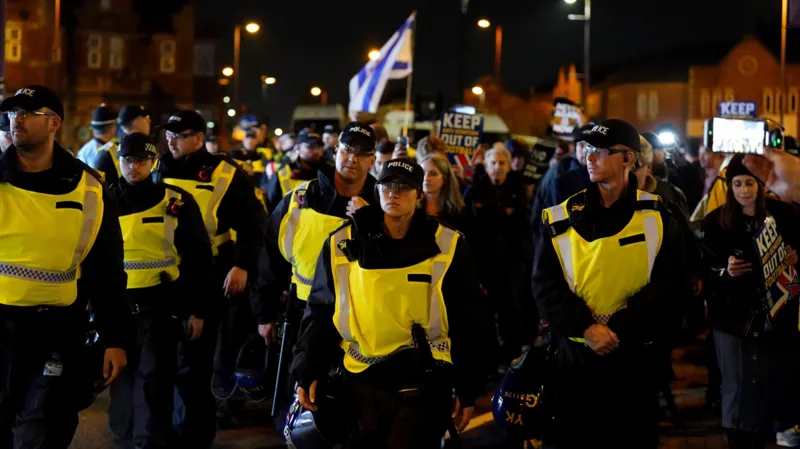West Midlands Police have defended their decision to ban Maccabi Tel Aviv fans from attending Thursday’s Europa League clash with Aston Villa, citing “significant hooliganism” as the primary reason. The force revealed the justification after facing intense criticism from politicians and campaigners who initially claimed the move was motivated by antisemitism.
More than 700 police officers from 20 forces were deployed around Villa Park as hundreds protested against the decision. Despite fears of unrest, the evening passed largely without major incidents. Ten people were arrested for offences including racially aggravated abuse and attempts to ignite fireworks near the stadium.
The controversy began in October, when it was announced that Maccabi supporters would not be permitted to attend the match. The decision triggered political backlash, with Prime Minister Sir Keir Starmer, Culture Secretary Lisa Nandy, and Conservative leader Kemi Badenoch among those expressing concern.
Starmer called the move “deeply troubling,” while Badenoch branded it a “national disgrace.” Nandy said the risk assessment appeared influenced by fans’ nationality and religion.
However, police have now clarified that the ban stemmed from credible intelligence about planned hooliganism, not from any discriminatory motive.
A spokesperson for West Midlands Police said:
“Our original statement did not go into specifics as it wasn’t deemed necessary or helpful at that time. When the political commentary around antisemitism developed, our priority was to engage key stakeholders within the Jewish community. We explained the hooliganism element very candidly to them.”
Chief Constable Craig Guildford has been called to appear before the Home Affairs Committee to further explain the force’s actions. He defended the decision, saying it was based on “an assessment of risk” to public safety.
The police maintained that intelligence indicated potential disorder involving Maccabi fans, prompting them to bar travelling supporters as a preventive measure. Chief Inspector Tom Joyce reiterated that the move aimed to ensure security, describing the match as “high-risk.”
During the game, both pro-Palestinian and pro-Israeli demonstrators gathered outside the ground. There were isolated scuffles as Aston Villa fans entered the stadium, but officers quickly dispersed troublemakers. Police confirmed there was no major disorder or disruption to the game.
Among those arrested were a 21-year-old man accused of trying to throw fireworks into Villa Park and two men, aged 34 and 29, charged with racially aggravated public order offences for shouting abuse at pro-Israel protesters. Two individuals were cautioned, two released without charge, and another man was prosecuted for refusing to remove a face covering under Section 60 powers.
Jack Angelides, CEO of Maccabi Tel Aviv, continued to question the ban’s necessity, telling the BBC:
“In decades of European travel with the club, this is the only country that has banned our fans. It’s time for some introspection and retrospection about why this has occurred.”
Nevertheless, former Metropolitan Police officer Ron Winch defended West Midlands Police, saying they “got the balance right.” He praised the decision to prioritise safety over optics, noting that the force’s approach helped avoid large-scale unrest.
“Villa Park is an older-style ground in a residential area, which makes it easier to seal off if needed,” Winch explained. “Credit to West Midlands Police for sticking with their decision.”
Community leaders near Villa Park also supported the handling of the event. Adil Parkar, from the nearby Al Falaah Mosque, said the night was “overall very safe,” commending police for preventing violence.
“We absolutely commend police for the work they did last night. It could easily have gone wrong,” he said.
While political debate continues, police are now reviewing footage from body-worn cameras and drones to identify any additional offenders.
The incident marks the first time Maccabi Tel Aviv fans have been banned from a European away fixture, underscoring the tension surrounding international matches amid wider political sensitivities.
Despite criticism from Westminster, senior officers insist their actions were necessary. As Guildford prepares to face parliamentary scrutiny, the force maintains that the priority was — and remains — ensuring public safety above all else.



